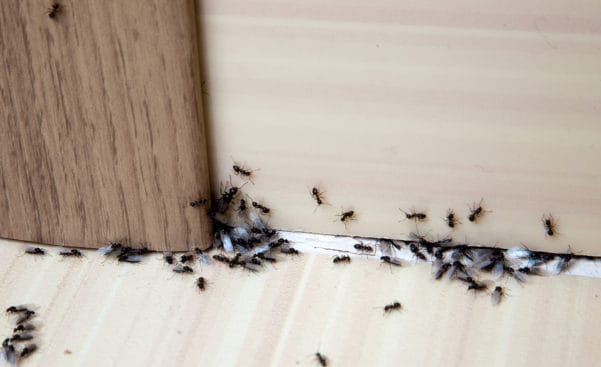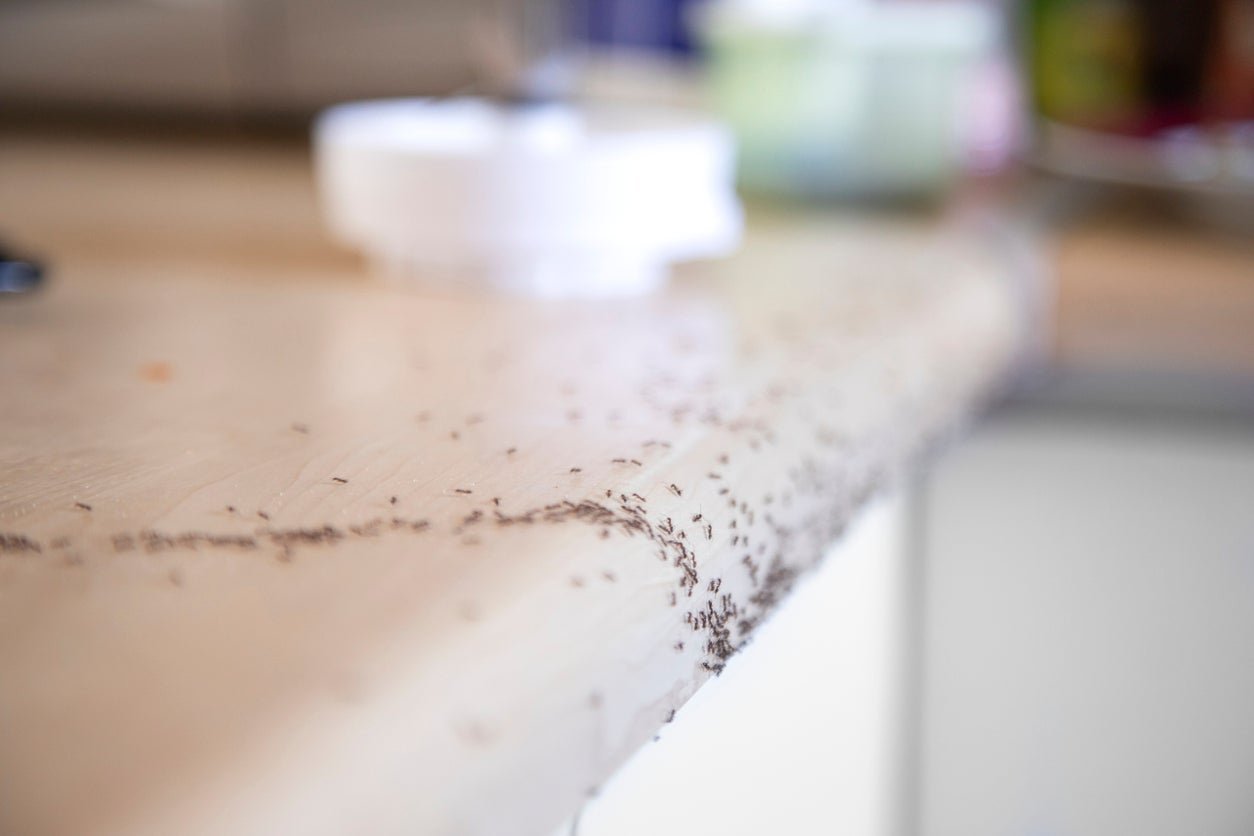To combat an ant infestation in your kitchen, identify and eliminate their food sources and entry points. Use bait traps, natural deterrents, or professional extermination as needed.
Dealing with an ant infestation in the kitchen can be frustrating, but with the right approach, it’s a battle you can win. Ants are attracted to the food and water available in kitchens, making this a common problem for homeowners.
The key is to act swiftly; the longer ants are allowed to establish themselves, the harder they are to remove. By keeping your kitchen clean, storing food in airtight containers, and addressing spills immediately, you can reduce the allure of your kitchen to these persistent invaders. For persistent issues, a combination of homemade solutions, such as vinegar or essential oils, with commercial ant traps can be effective. In severe cases, seeking professional pest control services may be necessary to fully eradicate the infestation.

Credit: www.callnorthwest.com
The Ant Issue In Kitchens
Ant infestations in kitchens can cause a real headache. It’s a place where we prepare food, and it should be hygienic and clean. But ants find kitchens attractive and invade for various reasons. This post will help you understand why ants march into your kitchen and detail the steps to kick them out for good.
Attractants: What Brings Ants Into Your Kitchen
Several things in your kitchen can attract ants. These insects are on a constant hunt for food and water. Here’s what might be inviting them:
- Spills or crumbs on counters
- Unclean dishes in the sink
- Sugary substances or sticky spots
- Overflowing garbage cans
- Excess moisture or standing water
To combat these attractants, maintain a clean kitchen, wipe surfaces regularly, and keep food stored properly.
Identifying Different Types Of Kitchen Ants
Not all ants are the same. Different types of ants pose different kinds of problems in your kitchen. It’s important to identify the type of ant to deal with the infestation effectively.
| Type | Appearance | Behavior |
|---|---|---|
| Odorous House Ants | Small, brown or black | Give off rotten smell when crushed |
| Carpenter Ants | Larger, black | Nest in wood, causing damage |
| Pavement Ants | Dark brown to black | Often found under floors or at ground level |
| Pharaoh Ants | Light yellow to red | Prefer warm, humid areas close to food and water |
Once you spot the type of ant, you can choose the right method to eliminate them.
Early Detection And Prevention
Are ants taking over your kitchen? You’re not alone. Many households face ant invasions, especially in warm weather. Early detection and prevention are key to keeping these tiny intruders at bay. Let’s explore how you can stop ant infestations before they start.
Regular Surveillance: Spotting The Scouts
Ant scouts are the forerunners of an infestation. They search for food and report back to the colony, leading others to the source. Regular checks in your kitchen can prevent a full-blown invasion.
- Check for scouts along windowsills, countertops, and pantries.
- Spotting a lone ant is a sign to take action immediately.
- Wipe down surfaces to erase any scent trails left behind.
Preventive Measures To Deter Ants
Maintaining a kitchen that deters ants involves simple, consistent actions. Here are some proven strategies:
| Action | Prevention Benefit |
|---|---|
| Store food in airtight containers | Eliminates food odors that attract ants |
| Seal cracks and crevices | Blocks entry points |
| Use natural ant repellents | Creates a barrier ants avoid |
- Regularly empty trash cans and wipe them clean.
- Remove standing water to prevent a water source for ants.
- Clean up food spills immediately, especially sugary substances.
Natural Ant Repellents
Natural ant repellents offer an eco-friendly solution to the common kitchen invader – ants. These remedies keep the environment safe. They also ensure your kitchen remains a no-go zone for these tiny pests. Discover natural strategies that turn your kitchen into an ant-resistant fortress.
Using Essential Oils
Eager to keep ants at bay with pleasant aromas? Essential oils hold the key. Ants dislike strong scents. They signal danger to them. Here’s how to use them effectively:
- Peppermint oil: Dilute with water. Spray on entry points.
- Tea tree oil: Mix a few drops with water. Spritz around your kitchen.
- Lemon eucalyptus oil: Dab onto a cotton ball. Tuck into corners ants frequent.
Reapply these oil solutions weekly. This maintains a strong scent barrier. Ensure containers are labeled clearly. Keep them away from children and pets.
Home Remedies You Can Try
Prefer solutions from everyday items? Home remedies are here to help. They are simple and effective. Try these options:
| Ingredient | Use |
|---|---|
| Vinegar | Create a cleaner with equal parts vinegar and water. Clean surfaces to deter ants. |
| Baking Soda & Powdered Sugar | Mix in a 1:1 ratio. Leave the mixture where you see ants to disrupt their trails. |
| Coffee Grounds | Scatter used coffee grounds around the garden. Ants avoid coffee’s strong smell. |
Regular application of these remedies enhances their effectiveness. Confirm every ingredient is safe. Consider allergies and sensitivities in your household.

Credit: www.adamspest.com
Chemical Solutions For Serious Infestations
Ant invasions in the kitchen can disrupt your home’s peace. The reliable route to reclaim your space involves chemical warfare. This section covers how to use effective, store-bought solutions. These methods are last resorts when natural deterrents fail.
Choosing The Right Ant Bait
To tackle ant issues, selecting the correct bait is vital. It should lure ants away from food sources. Ants mistake bait for food, carrying it back to the colony. This results in the queen’s demise and the eventual fall of the colony.
- Gel baits: Apply in cracks where ant activity is high.
- Granular baits: Spread near entry points and along trails.
- Station baits: Place in areas where ants are frequent.
Tip: Always follow the instructions on the label for safety and effectiveness.
When To Use Insecticide Sprays
Insecticide sprays are powerful when you need immediate action. They are best suited for targeting visible ant paths and nests. Spray directly onto the ants and their entry points.
| Spray Type | Use Case |
|---|---|
| Contact Sprays | Knockdown of ants on sight |
| Residual Sprays | Create barriers to prevent new ants from entering |
Remember: Insecticides contain harmful chemicals. Use them carefully to avoid contamination of food and surfaces.
Maintaining An Ant-free Kitchen
An ant-free kitchen sets your home up for a healthy, pest-free environment. Ant infestations bring frustration and hygiene concerns. This guide will explore effective strategies to keep ants away from your kitchen.
Best Practices For Food Storage
Proper food storage is vital for preventing ant invasions. Use airtight containers to keep food fresh and inaccessible to ants.
- Seal all pantry items, especially sweets and grains.
- Refrigerate ripe fruits and vegetables.
- Avoid leaving pet food out in the open.
| Item | Storage Solution |
|---|---|
| Sugar | Airtight Containers |
| Flour | Sealed Bins |
| Snacks | Re-sealable Bags |
Regular Cleaning Habits To Adopt
Clean kitchens discourage ants from entering. Stick to daily and weekly tasks for the best results.
- Wipe down surfaces after food preparation.
- Sweep floors to remove crumbs and spills.
- Regularly empty trash bins and use liners.
Focus on sink areas where water attracts ants. Empty the dishwasher promptly to prevent lingering food odors.
Professional Pest Control
Ant infestations in the kitchen can be more than a nuisance; they can compromise food hygiene and lead to stress. Often, home remedies and DIY solutions fall short in tackling the issue thoroughly. In such cases, professional pest control becomes a necessity. They offer specialized solutions that promise longer-lasting relief from ant problems. Knowing when to call in the professionals and what to expect from their services is essential for a pest-free kitchen.
When To Call The Professionals
It’s time to seek expert help when:
- Home remedies fail to stop the ants.
- There is a large-scale infestation.
- Food safety is compromised due to ants.
- Ants return despite repeated efforts to remove them.
What To Expect From Pest Control Services
This is what professional pest control services typically involve:
- Inspection of the infestation area.
- Identification of ant species and entry points.
- Creation of a customized treatment plan.
- Use of effective chemicals to eradicate ants.
- Follow-up visits to prevent recurrence.
With professional pest control, your kitchen will once again be a clean, safe space for your family’s culinary activities.

Credit: hawxpestcontrol.com
Frequently Asked Questions For How To Deal With Ant Infestation In Kitchen
How Do I Permanently Get Rid Of Ants In My Kitchen?
To permanently eliminate ants in your kitchen, consistently clean surfaces, store food in airtight containers, and seal entry points. Use natural deterrents like vinegar or commercial ant baits to address infestations. Regular maintenance is key to preventing reoccurrence.
Why Are There Suddenly So Many Ants In My Kitchen?
Ants may flood your kitchen seeking food, water, or shelter. Leaky fixtures, crumbs, and spills often attract these persistent insects. Regular cleaning and proper food storage can help deter them.
How Do You Get Rid Of An Ant Infestation?
Identify and seal entry points. Use baits near ant trails. Apply non-toxic diatomaceous earth. Keep your home clean to remove food sources. Consider professional pest control if infestations persist.
How Do I Find Out Where Ants Are Coming From In My Kitchen?
To find where ants enter your kitchen, look for ant trails, inspect walls, windows, and doors for small openings, and check for food crumbs or spills that attract them. Seal entry points and keep your kitchen clean to prevent their return.
Conclusion
Battling ants in your kitchen can be frustrating. Yet, with the right approach, it’s a winnable fight. Remember to keep surfaces clean and use natural deterrents effectively. For persistent problems, professional help is a wise choice. Stay vigilant and reclaim your space—your ant-free kitchen awaits.

I’m MD Tanvir, and I bring years of expertise gained from working closely with pest control companies to the forefront. My journey in the industry has inspired me to launch Bug Battler, a platform aimed at equipping people with the know-how to combat pests autonomously. Through Bug Battler, I aim to empower individuals with practical insights to tackle pest infestations effectively.

